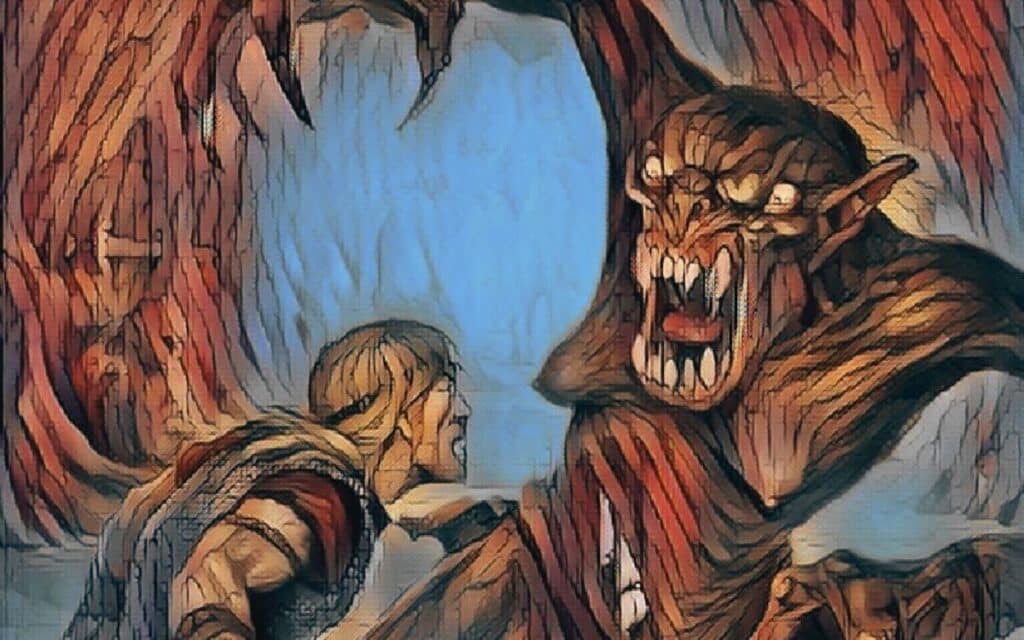Many ancient stories have horrific elements, but the Beowulf the oldest story in English (even if it’s Old English) is well and truly and horror story. We take a look at why you should be reading it!

The oldest known English horror story is probably Beowulf, an epic poem written in Old English in the 8th century.
Although it is primarily a heroic tale, it includes elements of horror, such as a monstrous, man-eating creature named Grendel who terrorises the kingdom of Heorot.
What is Beowulf?
Beowulf is an old English story about a hero named Beowulf who fights three different monsters.
First, he defeats a monster named Grendel who has been terrorising a kingdom. Then, he battles Grendel’s mother who is seeking revenge for her son’s death. Finally, Beowulf fights a dragon that is guarding a treasure hoard.
Beowulf is a brave and strong hero who is able to defeat all three monsters, but he is also mortal and dies from injuries sustained in his final battle.
The story is full of supernatural elements and is an epic tale of courage and heroism.
The story of Beowulf in 10 points
Here’s the story of Beowulf in 10 points:
- Beowulf is a warrior who helps a Danish kingdom called Heorot.
- He defeats the monster Grendel with his bare hands.
- Grendel’s mother seeks revenge and attacks Heorot.
- Beowulf kills her with a sword found in her lair.
- Beowulf becomes king of Geatland.
- A dragon attacks Beowulf’s kingdom.
- Beowulf and a warrior named Wiglaf kill the dragon, but Beowulf is mortally wounded.
- Beowulf dies and is burned on a funeral pyre.
- His people mourn him, and he is remembered as a great hero.
- The story teaches the importance of bravery and loyalty.
Why is it so important?
Beowulf is an important work of literature because it is one of the earliest surviving examples of English literature and provides insight into the culture and beliefs of the time period in which it was written.
The story is full of supernatural elements and is an epic tale of heroism and courage, which has made it a classic of English literature that has endured for centuries.
Additionally, Beowulf has influenced many later works of literature, including J.R.R. Tolkien’s The Lord of the Rings and other modern fantasy novels.
Beowulf also highlights the importance of oral storytelling in early English culture and serves as a reminder of the value of preserving cultural heritage and traditions.
The monsters of Beowulf
- Grendel: Grendel is a powerful monster that terrorises the mead hall of King Hrothgar, killing and devouring his warriors. He is described as being impervious to weapons, making him an almost invincible foe. Grendel is also depicted as a descendant of Cain, suggesting that he is inherently evil. He is eventually killed by Beowulf in a battle that takes place in the mead hall.
- Grendel’s mother: After Grendel is killed by Beowulf, his mother seeks revenge by attacking the mead hall. She is also a powerful and formidable opponent, and is able to withstand Beowulf’s sword. She is ultimately killed by Beowulf with a sword that he finds in her lair, which is said to be enchanted.
- The Dragon: The dragon is the final opponent that Beowulf must face, and is the most powerful of all the monsters in the poem. He guards a hoard of treasure, and his armored scales make him nearly invulnerable to attack. The dragon is eventually killed by Beowulf, but not before Beowulf himself is mortally wounded in the battle.
- Giants: The giants are supernatural beings who are said to have built the mead hall of King Hrothgar. They are depicted as being powerful and imposing, and their presence in the story adds to the epic and legendary nature of the poem.
- Water Wtch: The water witch is a supernatural being who appears in the story of Finn and Hnaef. She is said to have the power to control the weather and to bring about storms and floods. Her presence in the story highlights the supernatural elements that are present throughout the poem, and adds to the sense of wonder and mysticism that surrounds the world of Beowulf.
What do you think of Beowulf? Tell us in the comments section below!


Someone once commented that Tolkien’s greatest contribution to english literature was not Lord of the Rings but that he persuaded the great and the good at Oxford that Beowulf was fine literature in its own right and not just a linguistic oddity – an early survival of old english.
It’s great and it’s fun checking out the different translations. Seamus Heaney did a highly admired one and was recorded reading it – well worth tracking down as it’s a great way to introduce yourself to this classic.